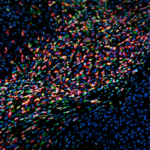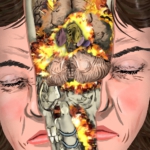The Pulse of Research
A miniscule bacterium can influence whether we are diseased or healthy, a virus or a cell can make the difference between life and death, and a therapy can put us on the path to recovery. How do we get back to health, how do we stay healthy, and why are we sometimes not healthy? Scientists at UDE are grappling with these core questions – and pooling their broad knowledge in the strategic research area in biomedical sciences.
The basic research in the natural sciences faculties is closely linked with clinical research in the fields of oncology, transplantation, the cardiovascular system, infectious diseases and immunology, and translational neurosciences and behavioural sciences at the University Hospital Essen. The strategic research area also includes the Centre for Medical Biotechnology (ZMB) and the Erwin L. Hahn Institute for Magnetic Resonance Imaging. But UDE has even more to offer in the field of health research: The Health Economics Research Center (CINCH) investigates the economic viability of the healthcare system, and the Research Center One Health Ruhr studies the mechanisms of health and disease far beyond human beings – from molecules to ecosystems.
Only by actively interconnecting all these research groups is it possible to foster and enable the development of ideas and innovations – and to represent health in all its facets. Here is an overview of the research highlights.
IKIM
Institute for Artificial Intelligence in Medicine (founded in 2019).
InUPH
Institute for Urban Public Health (founded in 2020)
CCCE
Cancer Research Center Cologne Essen is to become one of six National Centres for Tumour Diseases (NCT) in 2023, with long- term federal and state funding.
FIVE COLLABORATIVE RESEARCH CENTRES/TRANSREGIO (CRC/TRR) ARE FINANCED BY THE GERMAN RESEARCH FOUNDATION (DFG) WITH MORE THAN € 55 MILLION:
Coordination of Collaborative Research Centre (CRC) 1093: Supramolecular chemistry on proteins (until 2022)
€ 17 million in DFG funding.
Coordination of CRC/TRR 296:
LocoTact – Local control of thyroid hormone action (since 2020)
€ 14 million in DFG funding.
Coordination of CRC/TRR 289:
Treatment expectation (since 2020)
€ 12 million in German Research Foundation (DFG) funding.
Coordination of CRC 1430:
Molecular mechanisms of cell state transitions (since 2021)
€ 10 million in DFG funding.
Collaboration in CRC/TRR 332:
Neutrophils: Origin, fate & function (since 2022)
Funded by the DFG; € 3.2 million go to UDE.
FIVE RESEARCH TRAINING GROUPS (GRK) WITH MORE THAN € 30 MILLION IN FUNDING FROM THE GERMAN RESEARCH FOUNDATION (DFG):
GRK 2535:
Knowledge- and data-driven personalization of medicine at the point of care (since 2020)
GRK 1949:
Immune response in infectious diseases – regulation between innate and adaptive immunity (since 2014)
GRK 2762:
Heterogeneity, plasticity & dynamics in cancer cell, tumor and normal tissue responses to cancer radiotherapy (since 2022)
GRK 1739:
Molecular determinants of the cellular radiation response and their potential for response modulation (until 2021)
GRK 2098:
Biomedicine of the acid sphingomyelinase/ acid ceramidase system (until 2020)
Research unit (FOR) 2879:
ImmunoStroke – From immune cells to stroke recovery (since 2019)
€ 3 million in DFG funding.
KFO 337:
PhenoTImE – Phenotypic therapy and immune escape in cancers (since 2019)
€ 5.8 million in DFG funding.
Coordination of the joint project SATURN3:
Spatial and temporal resolution of intratumoral heterogeneity in 3 hard-to-treat cancers (since 2022)
Funded by the BMBF; € 2 million go to UDE.
TWO EMMY NOETHER JUNIOR RESEARCH GROUPS, WITH € 1.3 MILLION IN DFG FUNDING:
Multiplexed deconvolution of metastasis in vivo (Prof. Dr Barbara Grüner, since 2017)
Discovering novel metabolic vulnerabilities in melanoma metastasis (Prof. Dr Alpaslan Tasdogan, since 2021)
PROGRAMME FOR THE SUPPORT OF CLINICIAN SCIENTISTS:
UMEA – UDE Clinician Scientist Academy (DFG, since 2018)
UMESciA – Else Kröner Schools for Medical Scientists (EKFS, since 2021)
UMEA2 – support for advanced clinician scientists in the field of translational medicine (Federal Ministry of Education and Research [BMBF], since 2022)
HIGHLIGHTS FROM HEALTH ECONOMICS:
Participation in the Leibniz ScienceCampus Ruhr (since 2021): Health care challenges in regions with declining and ageing populations.
DFG project (until 2022): Human capital investments in a life-cycle perspective and across generations.
DFG project (since 2021): School closures and NPIs during the great influenza pandemic in Sweden.
Project collaboration on an international study, funded by the US National Institutes of Health (since 2021): The economic and social impact of COVID-19 mitigation policies.



